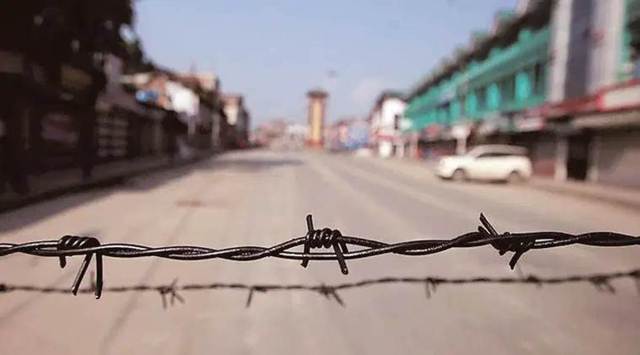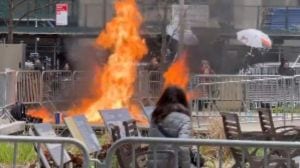- India
- International
On 74th Independence Day, PM Modi promises elections in J&K, but after delimitation
“Delimitation exercise is being carried out in Jammu and Kashmir. The country is committed for completion of this work so that elections are held and people’s representatives are elected there,” Modi said.
 The delimitation process is crucial for kick-starting the political process in Jammu and Kashmir. Express Photo
The delimitation process is crucial for kick-starting the political process in Jammu and Kashmir. Express PhotoPrime Minister Narendra Modi on Saturday promised the holding of assembly elections in Jammu and Kashmir after the delimitation exercise is over in the newly carved union territory.
Addressing the nation on the occasion of 74th Independence Day celebrations, Modi spoke about the changes that occurred in Jammu and Kashmir in the past one year and how they benefited the region.
“Delimitation exercise is being carried out in Jammu and Kashmir. The country is committed for completion of this work so that elections are held and people’s representatives are elected there,” Modi said.
The statement reaffirms Home Minister Amit Shah’s promise in Parliament that the newly carved union territory of Jammu and Kashmir would get a new Assembly in due course to improved security situation in the region.
Follow Independence day 2020 LIVE updates
It also underscores BJP’s ideological project in the region where it is of the view that Jammu has been discriminated against by a Kashmir-heavy polity and the delimitation exercise will ensure correct representation for the Jammu region in the next Assembly election.

In March this year, the Law Ministry notified the delimitation commission for Jammu and Kashmir, Assam, Arunachal Pradesh, Manipur and Nagaland. The three-member commission is being headed by former Supreme Court judge Justice Ranjana Prakash Desai.
Delimitation is the act of redrawing boundaries of Lok Sabha and Assembly seats to represent changes in population and is done on the basis of the last Census. Home Minister Amit Shah, while announcing reorganisation of the state of Jammu and Kashmir into the Union Territories of J&K and Ladakh, had said delimitation of Assembly constituencies of the erstwhile state would be carried out on the basis of the 2011 Census.
According to the J&K Reorganisation Act passed by Parliament last year, “…the number of seats in the Legislative Assembly of Union Territory of Jammu and Kashmir shall be increased from 107 to 114, and delimitation of the constituencies may be determined by the Election Commission in the manner hereinafter provided.”
Explained: How states are split into seats
Notably, 24 of the total seats in J&K remain perennially vacant as they are allotted to Pakistan-occupied Kashmir. The reorganisation Act also says Lok Sabha will have five seats from the Union Territory of J&K and Ladakh will have one seat.
The delimitation of Assembly constituencies in J&K has been a pet project of both the Sangh and the BJP. The party believes, and has openly said earlier, that even though the population in Jammu has increased over the years, Kashmir continues to have a disproportionately larger share of Assembly constituencies. This has effectively meant that only a party strong in Kashmir Valley is able to lead the state government.
BJP hopes it will have its chief minister in the union territory if delimitation is carried out as its core strength is in the Jammu region which currently has lesser seats.
The demand for delimitation of J&K was raised by BJP first in 2008 during the Amarnath land row. The BJP in J&K has been raising the issue of reorganisation of the state so that Jammu gets a larger share of seats in the 87-member Assembly. As of now, Kashmir region has 46 seats, followed by Jammu region with 37 and Ladakh with four. Even Congress leader Ghulam Nabi Azad, during his tenure as the CM, had tried to push for delimitation but could not get the PDP on board.
Political parties in the Valley have been opposed to a delimitation exercise. The National Conference in May this year rejected the process of delimitation in Jammu and Kashmir saying its three MPs from Kashmir—appointed as associate members in the Commission–will not accept their positions since that would be “tantamount to accepting the events of 5th August 2019”.
The party also said that constitution of the erstwhile state, “the constituencies of J&K were to be delimited in 2026 with rest of the country. The constituencies in the state were last delimited in ’90s”.
There is also opposition to the delimitation exercise from parties and groups with strongholds in Jammu. Even the BJP state unit has raised objections to 2011 Census being the basis for the delimitation exercise. These groups, including those of Kashmiri Pandits, and parties argue that the 2011 census is “fudged” in favour of Kashmir showing greater decadal growth in the Valley than in Jammu.
As per 2011 Census, the population of Kashmir region is about 15 lakh more than the Jammu region. While Kashmir has 68.9 lakh people, Jammu’s population stands at 53.8 lakh. In 2001 Census, this gap was of only 10 lakh.
Apr 19: Latest News
- 01
- 02
- 03
- 04
- 05






































